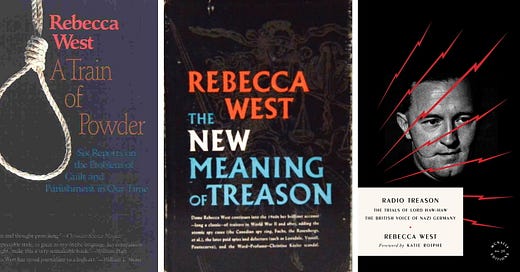Review: Sarah Ruden on Rebecca West
A writer who could think deeply and in crazy detail about important events that were recent, imminent, or actually happening
Editor’s note: Today’s post on Rebecca West became unexpectedly timely as Bill Owens, the executive producer of CBS’s “60 Minutes,” resigned yesterday after being pressured by CBS’s parent company to vet the show’s stories ahead of airing them. CBS is defending itself in a $20 billion lawsuit brought by President Trump over a “60 Minutes” segment, and CBS’s parent company, Paramount, is seeking government approval for a sale of the network to the son of Larry Ellison, whom President Trump has floated as a potential buyer for TikTok. Critic Emily Nussbaum posted a suggestion that the Broadway production of “Good Night & Good Luck,” mentioned in today’s post, might have to make some adjustments to incorporate the week’s events. Sarah writes that, with truth-telling under such duress, she yearns for a “serious yet creative” American journalism that will keep “searching and thinking” its way into “how problems arose and were solved in the long run—or got stuck unsolved.”
Last week, I took a trip to see George Clooney in Good Night and Good Luck, the limited-run show about the newsman Edward R. Murrow’s campaign against Joseph McCarthy’s hearings on suspected communists. This is a very American, very Broadway spectacle. The audience swooned over Clooney’s cigarette-ad looks and shuddered at McCarthy’s greasy ugliness, warmed to familiar footage and quotations, sighed with relief when the CBS business office lets Murrow attack the hearings, and bowed its head in reverence at the heart-rending price the great man paid: he was demoted to sucking up to celebrities, like Micky Rooney at home with yet another bride.
America apparently has a long, long way to go in the processing of its traumas through art. The lessons of this venerated production, which is supposed to buck us up in the midst of our present crises, are shallow in the extreme. I guess that if we do have the dumb luck to re-emerge, we will wait seventy years for a show pitting a slim, chic Rachel Maddow against a blowsy and flatulent President Trump—true as far as it goes, but so what?
Keep reading with a 7-day free trial
Subscribe to Book Post to keep reading this post and get 7 days of free access to the full post archives.



